•
SPEAKER BIOS • 2004
DANA
FRANK is Professor of American Studies at UC Santa
Cruz. She is the author of Three Strikeswith Howard Zinn
and Robin D. G. Kelley, Buy American: The Untold Story of Economic
Nationalism,and Purchasing Power.She is a member of AFT
Local 2199, the National Writers Union, and the UCSC Faculty Association,
and has long been active in labor solidarity work.
CLIFF
LEO TILLMAN, Jr.
 embarked on a career as a public agency worker in the East Bay,
but soon emerged as a rank-and-file union leader, later joining
the staff of his union, Service Employees International Union. In
1998 he was hired as Executive Director by SEIU Local 415, representing
public agency and non-profit sector workers in Santa Cruz County.
Since then, Local 415 has grown through aggressive organizing of
homecare and other workers, lobbied for passage of Living Wage ordinances
in 3 jurisdictions, and carried out a successful 3-day strike against
the County. Tillman currently serves as President of the Monterey
Bay Central Labor Council, AFL-CIO, and is active in local politics.
embarked on a career as a public agency worker in the East Bay,
but soon emerged as a rank-and-file union leader, later joining
the staff of his union, Service Employees International Union. In
1998 he was hired as Executive Director by SEIU Local 415, representing
public agency and non-profit sector workers in Santa Cruz County.
Since then, Local 415 has grown through aggressive organizing of
homecare and other workers, lobbied for passage of Living Wage ordinances
in 3 jurisdictions, and carried out a successful 3-day strike against
the County. Tillman currently serves as President of the Monterey
Bay Central Labor Council, AFL-CIO, and is active in local politics.
STEVE
ZELTZER is a labor video producer/programmer and
founder of the Labor Video Project. Since 1983 the project has produced
a labor cable TV show that is programmed in San Francisco, Philadelphia
and St. Louis. Among his labor documentaries which have been programmed
on KQED and PBS stations are Halfway To Hell, The Workers and
Unions That Built The Golden Gate Bridgeand Hanging Iron,
After the Quake Of '89.He is also one of the founders of LaborTech,
a conference of labor media communicators (www.labortech2004.org),
Labornet (www.labornet.org), and the Union Producers and Programmers
Network (UPPNET). He is also a working on the development of a labor
satellite TV channel called the Labor/Working Families Channel.
SAN
FRANCISCO MIME TROUPE
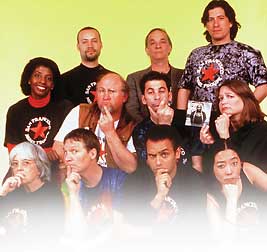 is a multiracial and multigenerational collective of satirists,
seeking to make audiences laugh at the absurdities of contemporary
life and at the same time see their causes. Their shows are about
the burning issues of our time and generally debunk the official
story. Since 1959 they have performed everywhere from public parks
to palaces of culture, aiming to reach the broadest possible audience.
Their trademark style draws from popular theater forms and is based
on their common elements: strong story line, avowed point of view,
larger-than-life characters, fantasy, and live music.
is a multiracial and multigenerational collective of satirists,
seeking to make audiences laugh at the absurdities of contemporary
life and at the same time see their causes. Their shows are about
the burning issues of our time and generally debunk the official
story. Since 1959 they have performed everywhere from public parks
to palaces of culture, aiming to reach the broadest possible audience.
Their trademark style draws from popular theater forms and is based
on their common elements: strong story line, avowed point of view,
larger-than-life characters, fantasy, and live music.
DAVID
WINTERS is a professional musician, officer in the
musicians union (AFM Local 153), and long-time coordinator of the
Western Workers Labor Heritage Festival. His musical offerings will
grace several festival events.
PAUL
ORTIZ is Assistant Professor in the Department of
Community Studies at UC Santa Cruz where he teaches courses on comparative
social movements, the African Diaspora, and the history of democracy.
He is a member of the UCSC Faculty Association and the American
Federation of Teachers. His work in the labor movement began when
he walked the picket line with the Greyhound bus drivers in their
1990 strike. He served as a volunteer boycott organizer with the
United Farm Workers of Washington State during their boycott of
Chateau Ste. Michelle Wines which led to the first-ever union contract
for Washington farm workers in 1995. Paul is co-author of Remembering
Jim Crow: African Americans Tell About Life in the Jim Crow South.
MARTA
RODRIGUEZ,
 legendary Colombian filmmaker, has devoted her career to exposing
human rights violations in her native country, from her early, ground-breaking
documentary on working-poor families, The Brickmakers(1972),
which she made with her husband, Jorge Silva, to her newest documentary
on Colombia's displaced peasants, Nunca Más / Never Again(2001),
a collaboration with Ecuadorian filmmaker Gustavo Guayasamin. Cinema
verite by Latin American filmmakers demonstrates the special advantage
of the insider's eye and the different social relations evoked in
front of the camera when the media makers are of the culture they
film or tape.
legendary Colombian filmmaker, has devoted her career to exposing
human rights violations in her native country, from her early, ground-breaking
documentary on working-poor families, The Brickmakers(1972),
which she made with her husband, Jorge Silva, to her newest documentary
on Colombia's displaced peasants, Nunca Más / Never Again(2001),
a collaboration with Ecuadorian filmmaker Gustavo Guayasamin. Cinema
verite by Latin American filmmakers demonstrates the special advantage
of the insider's eye and the different social relations evoked in
front of the camera when the media makers are of the culture they
film or tape.
BRIAN
MC WILLIAMS
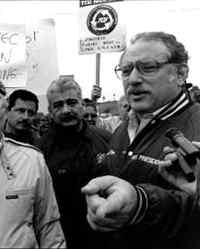 served 6 years as President of the 42,000 member International Longshore
and Warehouse Union, arguably the most progressive in the U.S. labor
movement. During his term he actively promoted organizing of new
members and maintaining existing union jobs. He led the ILWU delegation
in the 1999 WTO demonstration in Seattle and called for the closing
of West Coast ports on that occasion, consistent with his and the
union's history of standing up for social justice globally. In a
speech to ILWU pensioners just a week after the Twin Towers fell
in 2001, after condemning senseless acts of violence against innocent
people, McWilliams was able to articulate a perspective unusual
at the time: "Let us not be too quick to judge the terroristic acts
of others without taking a thorough look at our government's acts
of aggression, passive and otherwise, against our fellow citizens
of the world."
served 6 years as President of the 42,000 member International Longshore
and Warehouse Union, arguably the most progressive in the U.S. labor
movement. During his term he actively promoted organizing of new
members and maintaining existing union jobs. He led the ILWU delegation
in the 1999 WTO demonstration in Seattle and called for the closing
of West Coast ports on that occasion, consistent with his and the
union's history of standing up for social justice globally. In a
speech to ILWU pensioners just a week after the Twin Towers fell
in 2001, after condemning senseless acts of violence against innocent
people, McWilliams was able to articulate a perspective unusual
at the time: "Let us not be too quick to judge the terroristic acts
of others without taking a thorough look at our government's acts
of aggression, passive and otherwise, against our fellow citizens
of the world."
IAN
RUSKIN
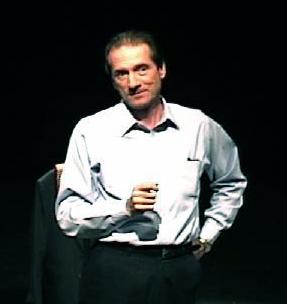 attended the Royal Academy of Dramatic Art in London and worked
in West End repertory theater, television and film. In Los Angeles
his work has ranged from Murder She Wroteto the acclaimed
one-man play The Man Himself.He has also done extensive voice
work in radio plays, commercials, and in over one hundred films
and television programs. He is founder and director of The Harry
Bridges Project and has portrayed Bridges in hundreds of theatrical
performances since 1994.
attended the Royal Academy of Dramatic Art in London and worked
in West End repertory theater, television and film. In Los Angeles
his work has ranged from Murder She Wroteto the acclaimed
one-man play The Man Himself.He has also done extensive voice
work in radio plays, commercials, and in over one hundred films
and television programs. He is founder and director of The Harry
Bridges Project and has portrayed Bridges in hundreds of theatrical
performances since 1994.
HASKELL
WEXLER
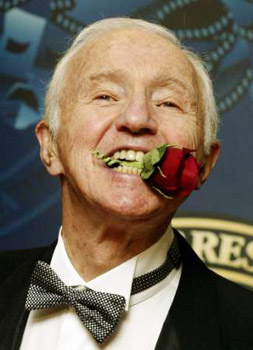 a native of Chicago, broke into feature films in 1959 as a cinematographer.
He received his first Academy Award for work in Who's Afraid
of Virginia Woolf?(1965). He produced and directed the documentary
Medium Cool(1969), a very successful and controversial film
that exposed the brutality of Chicago cops during targeting the
anti-war movement at the 1968 Democratic National Convention in
Chicago. Paramount refused to release Medium Coolfor almost
a year after Wexler had finished editing it. The executives asked
him to tone down the police-brutality scenes, but he wouldn't do
it. The Motion Picture Association of America gave the film an X
rating -- ostensibly because it had a nude scene. Wexler maintains
to this day that the X stood for unacceptable political content.
During the 1980s, he also produced and directed the feature film
Latino(1985), which was highly critical of American policy
in Central America. Wexler filmed numerous important works including
Matewanand Bread & Roses,shown during previous Reel
Workseasons, and has received several Oscars. The film industry
recognized Wexler's genius in 1996, giving him the Motion Picture
Academy's Lifetime Achievement Award. At the time he was videotaping
bus riders in Los Angeles to dramatize the ordeal of getting from
the ghetto to downtown L.A. by public transit. It was his third
"bus" documentary. The first was a 1963 film about freedom riders.
The second, some twenty years later, was about a bus full of people
making a cross-country trip for peace and disarmament. Saul Landau
has named him "The people's cinematographer."
a native of Chicago, broke into feature films in 1959 as a cinematographer.
He received his first Academy Award for work in Who's Afraid
of Virginia Woolf?(1965). He produced and directed the documentary
Medium Cool(1969), a very successful and controversial film
that exposed the brutality of Chicago cops during targeting the
anti-war movement at the 1968 Democratic National Convention in
Chicago. Paramount refused to release Medium Coolfor almost
a year after Wexler had finished editing it. The executives asked
him to tone down the police-brutality scenes, but he wouldn't do
it. The Motion Picture Association of America gave the film an X
rating -- ostensibly because it had a nude scene. Wexler maintains
to this day that the X stood for unacceptable political content.
During the 1980s, he also produced and directed the feature film
Latino(1985), which was highly critical of American policy
in Central America. Wexler filmed numerous important works including
Matewanand Bread & Roses,shown during previous Reel
Workseasons, and has received several Oscars. The film industry
recognized Wexler's genius in 1996, giving him the Motion Picture
Academy's Lifetime Achievement Award. At the time he was videotaping
bus riders in Los Angeles to dramatize the ordeal of getting from
the ghetto to downtown L.A. by public transit. It was his third
"bus" documentary. The first was a 1963 film about freedom riders.
The second, some twenty years later, was about a bus full of people
making a cross-country trip for peace and disarmament. Saul Landau
has named him "The people's cinematographer."
|
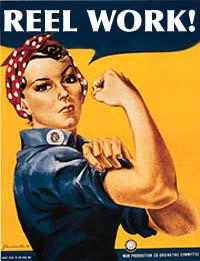
 embarked on a career as a public agency worker in the East Bay,
but soon emerged as a rank-and-file union leader, later joining
the staff of his union, Service Employees International Union. In
1998 he was hired as Executive Director by SEIU Local 415, representing
public agency and non-profit sector workers in Santa Cruz County.
Since then, Local 415 has grown through aggressive organizing of
homecare and other workers, lobbied for passage of Living Wage ordinances
in 3 jurisdictions, and carried out a successful 3-day strike against
the County. Tillman currently serves as President of the Monterey
Bay Central Labor Council, AFL-CIO, and is active in local politics.
embarked on a career as a public agency worker in the East Bay,
but soon emerged as a rank-and-file union leader, later joining
the staff of his union, Service Employees International Union. In
1998 he was hired as Executive Director by SEIU Local 415, representing
public agency and non-profit sector workers in Santa Cruz County.
Since then, Local 415 has grown through aggressive organizing of
homecare and other workers, lobbied for passage of Living Wage ordinances
in 3 jurisdictions, and carried out a successful 3-day strike against
the County. Tillman currently serves as President of the Monterey
Bay Central Labor Council, AFL-CIO, and is active in local politics.
 is a multiracial and multigenerational collective of satirists,
seeking to make audiences laugh at the absurdities of contemporary
life and at the same time see their causes. Their shows are about
the burning issues of our time and generally debunk the official
story. Since 1959 they have performed everywhere from public parks
to palaces of culture, aiming to reach the broadest possible audience.
Their trademark style draws from popular theater forms and is based
on their common elements: strong story line, avowed point of view,
larger-than-life characters, fantasy, and live music.
is a multiracial and multigenerational collective of satirists,
seeking to make audiences laugh at the absurdities of contemporary
life and at the same time see their causes. Their shows are about
the burning issues of our time and generally debunk the official
story. Since 1959 they have performed everywhere from public parks
to palaces of culture, aiming to reach the broadest possible audience.
Their trademark style draws from popular theater forms and is based
on their common elements: strong story line, avowed point of view,
larger-than-life characters, fantasy, and live music.
 legendary Colombian filmmaker, has devoted her career to exposing
human rights violations in her native country, from her early, ground-breaking
documentary on working-poor families, The Brickmakers(1972),
which she made with her husband, Jorge Silva, to her newest documentary
on Colombia's displaced peasants, Nunca Más / Never Again(2001),
a collaboration with Ecuadorian filmmaker Gustavo Guayasamin. Cinema
verite by Latin American filmmakers demonstrates the special advantage
of the insider's eye and the different social relations evoked in
front of the camera when the media makers are of the culture they
film or tape.
legendary Colombian filmmaker, has devoted her career to exposing
human rights violations in her native country, from her early, ground-breaking
documentary on working-poor families, The Brickmakers(1972),
which she made with her husband, Jorge Silva, to her newest documentary
on Colombia's displaced peasants, Nunca Más / Never Again(2001),
a collaboration with Ecuadorian filmmaker Gustavo Guayasamin. Cinema
verite by Latin American filmmakers demonstrates the special advantage
of the insider's eye and the different social relations evoked in
front of the camera when the media makers are of the culture they
film or tape.
 served 6 years as President of the 42,000 member International Longshore
and Warehouse Union, arguably the most progressive in the U.S. labor
movement. During his term he actively promoted organizing of new
members and maintaining existing union jobs. He led the ILWU delegation
in the 1999 WTO demonstration in Seattle and called for the closing
of West Coast ports on that occasion, consistent with his and the
union's history of standing up for social justice globally. In a
speech to ILWU pensioners just a week after the Twin Towers fell
in 2001, after condemning senseless acts of violence against innocent
people, McWilliams was able to articulate a perspective unusual
at the time: "Let us not be too quick to judge the terroristic acts
of others without taking a thorough look at our government's acts
of aggression, passive and otherwise, against our fellow citizens
of the world."
served 6 years as President of the 42,000 member International Longshore
and Warehouse Union, arguably the most progressive in the U.S. labor
movement. During his term he actively promoted organizing of new
members and maintaining existing union jobs. He led the ILWU delegation
in the 1999 WTO demonstration in Seattle and called for the closing
of West Coast ports on that occasion, consistent with his and the
union's history of standing up for social justice globally. In a
speech to ILWU pensioners just a week after the Twin Towers fell
in 2001, after condemning senseless acts of violence against innocent
people, McWilliams was able to articulate a perspective unusual
at the time: "Let us not be too quick to judge the terroristic acts
of others without taking a thorough look at our government's acts
of aggression, passive and otherwise, against our fellow citizens
of the world."
 attended the Royal Academy of Dramatic Art in London and worked
in West End repertory theater, television and film. In Los Angeles
his work has ranged from Murder She Wroteto the acclaimed
one-man play The Man Himself.He has also done extensive voice
work in radio plays, commercials, and in over one hundred films
and television programs. He is founder and director of The Harry
Bridges Project and has portrayed Bridges in hundreds of theatrical
performances since 1994.
attended the Royal Academy of Dramatic Art in London and worked
in West End repertory theater, television and film. In Los Angeles
his work has ranged from Murder She Wroteto the acclaimed
one-man play The Man Himself.He has also done extensive voice
work in radio plays, commercials, and in over one hundred films
and television programs. He is founder and director of The Harry
Bridges Project and has portrayed Bridges in hundreds of theatrical
performances since 1994.
 a native of Chicago, broke into feature films in 1959 as a cinematographer.
He received his first Academy Award for work in Who's Afraid
of Virginia Woolf?(1965). He produced and directed the documentary
Medium Cool(1969), a very successful and controversial film
that exposed the brutality of Chicago cops during targeting the
anti-war movement at the 1968 Democratic National Convention in
Chicago. Paramount refused to release Medium Coolfor almost
a year after Wexler had finished editing it. The executives asked
him to tone down the police-brutality scenes, but he wouldn't do
it. The Motion Picture Association of America gave the film an X
rating -- ostensibly because it had a nude scene. Wexler maintains
to this day that the X stood for unacceptable political content.
During the 1980s, he also produced and directed the feature film
Latino(1985), which was highly critical of American policy
in Central America. Wexler filmed numerous important works including
Matewanand Bread & Roses,shown during previous Reel
Workseasons, and has received several Oscars. The film industry
recognized Wexler's genius in 1996, giving him the Motion Picture
Academy's Lifetime Achievement Award. At the time he was videotaping
bus riders in Los Angeles to dramatize the ordeal of getting from
the ghetto to downtown L.A. by public transit. It was his third
"bus" documentary. The first was a 1963 film about freedom riders.
The second, some twenty years later, was about a bus full of people
making a cross-country trip for peace and disarmament. Saul Landau
has named him "The people's cinematographer."
a native of Chicago, broke into feature films in 1959 as a cinematographer.
He received his first Academy Award for work in Who's Afraid
of Virginia Woolf?(1965). He produced and directed the documentary
Medium Cool(1969), a very successful and controversial film
that exposed the brutality of Chicago cops during targeting the
anti-war movement at the 1968 Democratic National Convention in
Chicago. Paramount refused to release Medium Coolfor almost
a year after Wexler had finished editing it. The executives asked
him to tone down the police-brutality scenes, but he wouldn't do
it. The Motion Picture Association of America gave the film an X
rating -- ostensibly because it had a nude scene. Wexler maintains
to this day that the X stood for unacceptable political content.
During the 1980s, he also produced and directed the feature film
Latino(1985), which was highly critical of American policy
in Central America. Wexler filmed numerous important works including
Matewanand Bread & Roses,shown during previous Reel
Workseasons, and has received several Oscars. The film industry
recognized Wexler's genius in 1996, giving him the Motion Picture
Academy's Lifetime Achievement Award. At the time he was videotaping
bus riders in Los Angeles to dramatize the ordeal of getting from
the ghetto to downtown L.A. by public transit. It was his third
"bus" documentary. The first was a 1963 film about freedom riders.
The second, some twenty years later, was about a bus full of people
making a cross-country trip for peace and disarmament. Saul Landau
has named him "The people's cinematographer."